高一英语时态练习
高一英语动词时态练习题30题
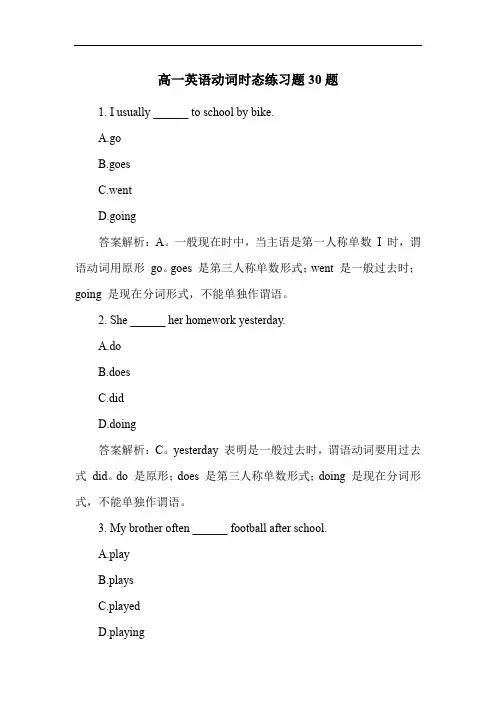
高一英语动词时态练习题30题1. I usually ______ to school by bike.A.goB.goesC.wentD.going答案解析:A。
一般现在时中,当主语是第一人称单数I 时,谓语动词用原形go。
goes 是第三人称单数形式;went 是一般过去时;going 是现在分词形式,不能单独作谓语。
2. She ______ her homework yesterday.A.doB.doesC.didD.doing答案解析:C。
yesterday 表明是一般过去时,谓语动词要用过去式did。
do 是原形;does 是第三人称单数形式;doing 是现在分词形式,不能单独作谓语。
3. My brother often ______ football after school.A.playB.playsC.playedD.playing答案解析:B。
一般现在时中,当主语是第三人称单数my brother 时,谓语动词用plays。
play 是原形;played 是一般过去时;playing 是现在分词形式,不能单独作谓语。
4. We ______ a picnic last weekend.A.haveB.hasC.hadD.having答案解析:C。
last weekend 表明是一般过去时,谓语动词要用过去式had。
have 是原形;has 是第三人称单数形式;having 是现在分词形式,不能单独作谓语。
5. My mother ______ breakfast every morning.A.makeB.makesC.madeD.making答案解析:B。
一般现在时中,当主语是第三人称单数my mother 时,谓语动词用makes。
make 是原形;made 是一般过去时;making 是现在分词形式,不能单独作谓语。
6. I ______ to music last night.A.listenB.listensD.listening答案解析:C。
高一英语动词时态练习题30题
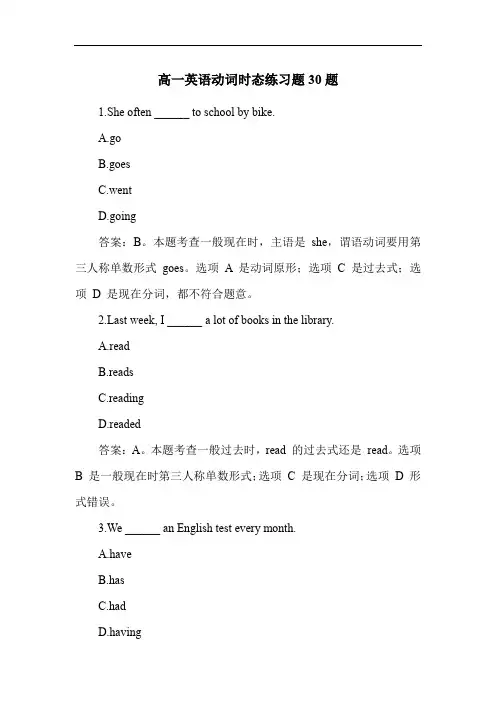
高一英语动词时态练习题30题1.She often ______ to school by bike.A.goB.goesC.wentD.going答案:B。
本题考查一般现在时,主语是she,谓语动词要用第三人称单数形式goes。
选项A 是动词原形;选项C 是过去式;选项D 是现在分词,都不符合题意。
st week, I ______ a lot of books in the library.A.readB.readsC.readingD.readed答案:A。
本题考查一般过去时,read 的过去式还是read。
选项B 是一般现在时第三人称单数形式;选项C 是现在分词;选项D 形式错误。
3.We ______ an English test every month.A.haveB.hasC.hadD.having答案:A。
本题考查一般现在时,主语是we,谓语动词用原形have。
选项B 是第三人称单数形式;选项C 是过去式;选项D 是现在分词。
4.My classmates ______ basketball after school yesterday.A.playB.playedC.playsD.playing答案:B。
本题考查一般过去时,yesterday 表明是过去的时间,谓语动词用过去式played。
选项 A 是原形;选项 C 是一般现在时第三人称单数形式;选项D 是现在分词。
5.The teacher usually ______ us a lot of homework.A.giveB.givesC.gaveD.giving答案:B。
本题考查一般现在时,主语是the teacher,谓语动词用第三人称单数形式gives。
选项 A 是原形;选项C 是过去式;选项D 是现在分词。
6.I ______ to the park with my friends last Sunday.A.goB.goesD.going答案:C。
高一英语时态训练
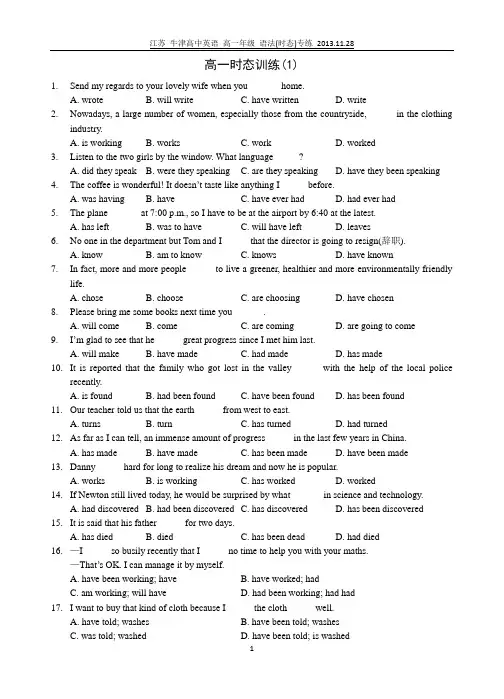
高一时态训练(1)1. Send my regards to your lovely wife when you ______ home.A. wroteB. will writeC. have writtenD. write2. Nowadays, a large number of women, especially those from the countryside, _____ in the clothingindustry.A. is workingB. worksC. workD. worked3. Listen to the two girls by the window. What language _____?A. did they speakB. were they speakingC. are they speakingD. have they been speaking4. The coffee is wonderful! It doesn’t taste like anything I _____ before.A. was havingB. haveC. have ever hadD. had ever had5. The plane ______ at 7:00 p.m., so I have to be at the airport by 6:40 at the latest.A. has leftB. was to haveC. will have leftD. leaves6. No one in the department but Tom and I _____ that the director is going to resign(辞职).A. knowB. am to knowC. knowsD. have known7. In fact, more and more people _____ to live a greener, healthier and more environmentally friendlylife.A. choseB. chooseC. are choosingD. have chosen8. Please bring me some books next time you ______.A. will comeB. comeC. are comingD. are going to come9. I’m glad to see that he _____ great progress since I met him last.A. will makeB. have madeC. had madeD. has made10. It is reported that the family who got lost in the valley _____ with the help of the local policerecently.A. is foundB. had been foundC. have been foundD. has been found11. Our teacher told us that the earth _____ from west to east.A. turnsB. turnC. has turnedD. had turned12. As far as I can tell, an immense amount of progress _____ in the last few years in China.A. has madeB. have madeC. has been madeD. have been made13. Danny _____ hard for long to realize his dream and now he is popular.A. worksB. is workingC. has workedD. worked14. If Newton still lived today, he would be surprised by what ______ in science and technology.A. had discoveredB. had been discoveredC. has discoveredD. has been discovered15. It is said that his father _____ for two days.A. has diedB. diedC. has been deadD. had died16. —I _____ so busily recently that I _____ no time to help you with your maths.—That’s OK. I can manage it by myself.A. have been working; haveB. have worked; hadC. am working; will haveD. had been working; had had17. I want to buy that kind of cloth because I _____ the cloth _____ well.A. have told; washesB. have been told; washesC. was told; washedD. have been told; is washed18. Jim talked for about half an hour yesterday. Never _____ hi talk so much.A. I heardB. did I hearC. I had heardD. had I heard19. —I dropped in at your house at about ten last night, but you weren’t in.—I _____ regular exercises at the club.A. didB. was doingC. had doneD. have been doing20. Selecting s mobile phone for a personal use is no easy task because technology _____ so rapidly.A. is changingB. has changedC. will have changedD. will change21. Professor Smith, along with his assistants, _____ on the project day and night to meet the deadline.A. workB. workingC. is workingD. are working22. Every time I _____ there, I will buy him something nice.A. wentB. will goC. goD. have gone23. —Look! How long _____ like this?—Three weeks! It’s usual here that rain _____ without stopping these days of the year.A. has it rained; poursB. has it been raining; poursC. is it raining; is pouringD. does it rain; pours24. —Why, Jack, you look so tired!—Well, I _____ the house and I must finish the work tomorrow.A. was paintingB. will be paintingC. have paintedD. have been painting25. Over the past decades, sea ice _____ in the Arctic as a result of global warming.A. has decreasedB. decreasedC. has been decreasingD. is decreasing26. ―Don’t put the waste on the ground.―Oh, I’m very sorry. I ______ the dustbin there.A. don’t seeB. isn’t seeingC. didn’t seeD. haven’t seen27. Although medical science ____ control over several dangerous diseases, what worries us is thatsome of them are returning.A. achievedB. has achievedC. will achieveD. had achieved28. —Hi, Henry, can I use your car for a while this afternoon?—Sorry. ____________.A. It’s repairedB. have repairedC. It’s being repaired.D. It had been repaired.29. I thought John would say something about his new job, but he _____ it.A. hasn’t mentionedB. hadn’t mentionedC. didn’t mentionedD. doesn’t mention30. —Have you graduated from college?—Yes. I _____ there for five years.A. studiedB. studyC. have studiedD. had studiedDCCCD CCBDC ACCDC ABDBA CCBDC CBCCA。
高一英语时态单选题50题
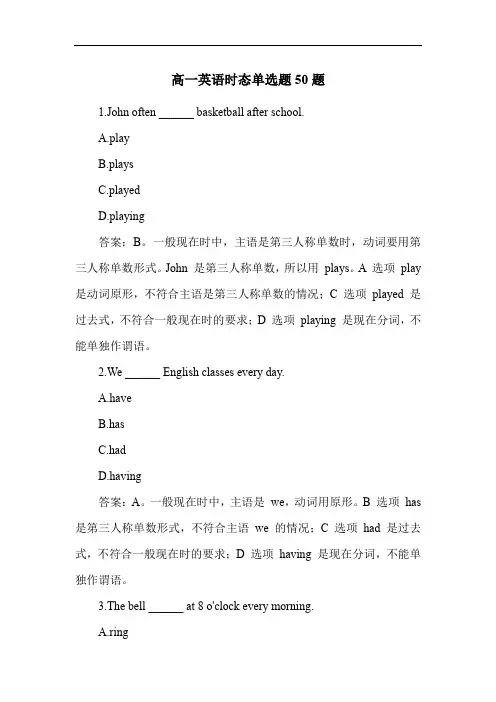
高一英语时态单选题50题1.John often ______ basketball after school.A.playB.playsC.playedD.playing答案:B。
一般现在时中,主语是第三人称单数时,动词要用第三人称单数形式。
John 是第三人称单数,所以用plays。
A 选项play 是动词原形,不符合主语是第三人称单数的情况;C 选项played 是过去式,不符合一般现在时的要求;D 选项playing 是现在分词,不能单独作谓语。
2.We ______ English classes every day.A.haveB.hasC.hadD.having答案:A。
一般现在时中,主语是we,动词用原形。
B 选项has 是第三人称单数形式,不符合主语we 的情况;C 选项had 是过去式,不符合一般现在时的要求;D 选项having 是现在分词,不能单独作谓语。
3.The bell ______ at 8 o'clock every morning.A.ringB.ringsC.rangD.ringing答案:B。
一般现在时表示经常性的动作。
主语the bell 是第三人称单数,所以动词用第三人称单数形式rings。
A 选项ring 是动词原形,不符合主语是第三人称单数的情况;C 选项rang 是过去式,不符合一般现在时的要求;D 选项ringing 是现在分词,不能单独作谓语。
4.Mary and Lucy ______ good friends.A.isB.areC.wasD.were答案:B。
一般现在时中,主语是Mary and Lucy,是复数,所以动词用are。
A 选项is 是第三人称单数形式,不符合主语是复数的情况;C 选项was 和D 选项were 都是过去式,不符合一般现在时的要求。
5.The students ______ their homework in the evening.A.doB.doesC.didD.doing答案:A。
高一英语动词时态混合练习(含一般过去时、现在完成时、过去完成时等)单选题30题
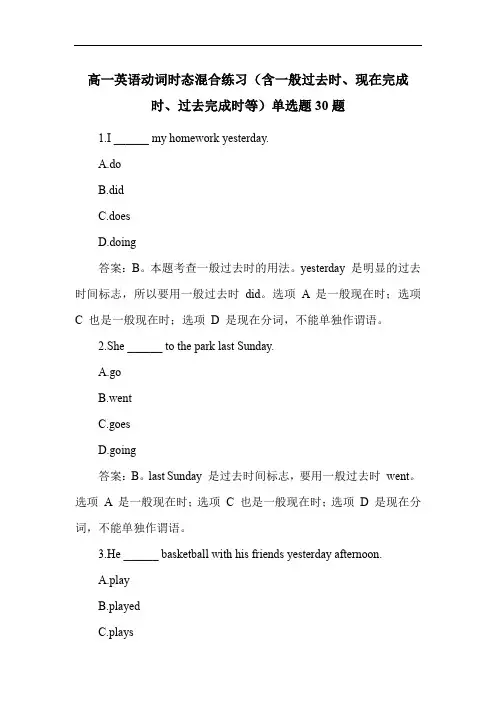
高一英语动词时态混合练习(含一般过去时、现在完成时、过去完成时等)单选题30题1.I ______ my homework yesterday.A.doB.didC.doesD.doing答案:B。
本题考查一般过去时的用法。
yesterday 是明显的过去时间标志,所以要用一般过去时did。
选项 A 是一般现在时;选项C 也是一般现在时;选项D 是现在分词,不能单独作谓语。
2.She ______ to the park last Sunday.A.goB.wentC.goesD.going答案:B。
last Sunday 是过去时间标志,要用一般过去时went。
选项 A 是一般现在时;选项C 也是一般现在时;选项D 是现在分词,不能单独作谓语。
3.He ______ basketball with his friends yesterday afternoon.A.playB.playedC.plays答案:B。
yesterday afternoon 是过去时间标志,用一般过去时played。
选项A 是一般现在时;选项C 也是一般现在时;选项D 是现在分词,不能单独作谓语。
4.We ______ a movie last weekend.A.seeB.sawC.seesD.seeing答案:B。
last weekend 是过去时间标志,用一般过去时saw。
选项 A 是一般现在时;选项C 也是一般现在时;选项D 是现在分词,不能单独作谓语。
5.They ______ shopping on Monday.A.goB.wentC.goesD.going答案:B。
on Monday 在这里表示过去的某个周一,用一般过去时went。
选项A 是一般现在时;选项C 也是一般现在时;选项D 是现在分词,不能单独作谓语。
6.I ______ my homework already.A.have finishedC.will finishD.finish答案:A。
(完整版)人教版高一英语时态练习题
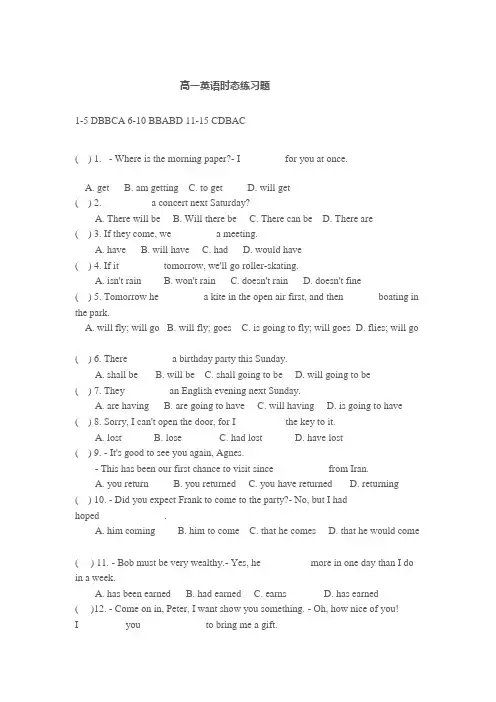
高一英语时态练习题1-5 DBBCA 6-10 BBABD 11-15 CDBAC( ) 1. - Where is the morning paper?- I ________ for you at once.A. getB. am gettingC. to getD. will get( ) 2. ________ a concert next Saturday?A. There will beB. Will there beC. There can beD. There are( ) 3. If they come, we ________ a meeting.A. haveB. will haveC. hadD. would have( ) 4. If it ________ tomorrow, we'll go roller-skating.A. isn't rainB. won't rainC. doesn't rainD. doesn't fine( ) 5. Tomorrow he ________ a kite in the open air first, and then ______ boating in the park.A. will fly; will goB. will fly; goesC. is going to fly; will goesD. flies; will go( ) 6. There ________ a birthday party this Sunday.A. shall beB. will beC. shall going to beD. will going to be( ) 7. They ________ an English evening next Sunday.A. are havingB. are going to haveC. will havingD. is going to have ( ) 8. Sorry, I can't open the door, for I ________ the key to it.A. lostB. loseC. had lostD. have lost( ) 9. - It's good to see you again, Agnes.- This has been our first chance to visit since ________ from Iran.A. you returnB. you returnedC. you have returnedD. returning ( ) 10. - Did you expect Frank to come to the party?- No, but I hadhoped ________ .A. him comingB. him to comeC. that he comesD. that he would come( ) 11. - Bob must be very wealthy.- Yes, he ________ more in one day than I do in a week.A. has been earnedB. had earnedC. earnsD. has earned( )12. - Come on in, Peter, I want show you something. - Oh, how nice of you!I ________ you ________ to bring me a gift.A. didn't think, were goingB. hadn't thought, were goingC. never think, are goingD. never thought, were going( ) 13.I first met Lisa three years ago. She ___ at a radio shop at the time.A. has workedB. was workingC. had been workingD. had worked( ) 14. The reporter said that the UFO ___ east to west when he saw it.A. was travelingB. traveledC. had been travelingD. was to travel ( ) 15. " What ' s the matter, Ali? You look sad. "" Oh, nothing much. As a matter of fact, I ___ of my friends back home. "A. just thoughtB. have just been thinkingC. was just thinkingD. have just thought16-20 DCCCB 21-25 BDAAA( ) 16. When Li Ming hurried home, he found that his mother ____already ____to hospital.A has; been sentB had; sentC has; sentD had; been sent( )17. She _____her keys in the office so she had to wait until her husband____home.A has left; comesB had left; would comeC had left; cameD left; had come ( )18. Zhao Lan ______already ______in this school for two years.A. was ; studyingB. will ; studyC. has ; studiedD. are ; studying ( )19. We ______ Xiao Li since she was a little girl.A. knowB. had knownC. have knownD. knew( ) 20. Harry Potter is a very nice film .I_______ it twice.A. will seeB. have seenC. sawD. see( )21.-These farmers have been to the United States.-Really ? When_____ there ?A. will they goB. did they goC. do they goD. have they gone ( ) 22. The house belongs to my aunt but she _____ here any more .A. hasn't livedB. didn't liveC. hadn't livedD. doesn't live( ) 23. Your job _______ open for your return . ---Thanks .A. will be keptB. will keepC. had keptD. had been kept( ) 24.The young girl sitting next to me on the plane was very nervous . She ______ before .A. hasn't flownB. didn't flyC. hadn't flownD. wasn't flying( ) 25.---Mr Gorden asked me to remind you of the meeting this afternoon . Don't you forget it !---OK. I ______ .A. won'tB. don'tC. willD. do。
高一英语时态练习
高一英语时态练习(印全级)( ) 1. If they come, we ________ a meeting.A. haveB. will haveC. hadD. would have( ) 2. If it ________ tomorrow, we’ll go roller-skating.A. isn’t rainB. won’t rainC. doesn’t rainD. doesn’t fine( ) 3. They ________ an English evening next Sunday.A. are havingB. are going to haveC. will havingD. is going to have( ) 4. —It’s good to see you again, Agnes.— This has been our first chance to visit since from Iran.A. you returnB. you returnedC. you have returnedD. returning( ) 5. — Bob must be very wealthy. — Yes, he more in one day than I do in a week. A. has been earned B. had earned C. earns D. has earned( ) 6.I first met Lisa three years ago. She ___ at a radio shop at the time.A. has workedB. was workingC. is workingD. had worked( )7. The reporter said that the UFO ___ east to west when he saw it.A. was travelingB. traveledC. is travelingD. was to travel( ) 8. Zhao Lan ______already ______in this school for two years.A. was ; studyingB. will ; studyC. has ; studiedD. are ; studying( ) 9.The young girl sitting next to me on the plane was very nervous . She ______ before .A. hasn't flownB. didn't flyC. hadn't flownD. wasn't flying( ) 10.---Mr Gorden asked me to remind you of the me eting this afternoon . Don’t forget it ! ---OK. I ______ .A. won'tB. don'tC. willD. do( )11 When I reached home, my parents __________their supper.A.are havingB.have already hadC.have hadD. had already had( )12. My sister __________ TV at the moment.A. watchedB. is watchingC. have watchedD. was watching( )13. I ______ ping-pong quite well, but I haven’t had time to play since the New Year.A. will playB. have playedC. playedD. play( )14. I first met Tom 10 years ago. He ______ in a radio factory at that time.A. had workedB. has workedC. was workingD. is working( )15 --- What ______ when I phoned you?--- I ______ my work, and I wanted to go out.A. have you done; finishedB. were you doing; have finishedC. did you do; had just finishedD. were you doing; had just finished( )16. They won’t buy new clothes because they ______ money to buy a new house.A.saveB.are savingC.have savedD.were saving( )17. The traffic in our city is already good and it ______ even better.A.getsB.gotC.has gotD.is getting( )18. I used to drink a lot of tea but these days I ______ coffee.A. preferB. preferredC. had preferredD. am preferring( )19. When he was alive, the old scientist used to say that knowledge ______ from practice and he gained his experience by doing a lot of practical work.A. was comingB. had comeC. comesD. would come( )20.--- How are you planning to travel to Shanghai?--- I ______ yet, but I ______ taking a train.A. didn’t decide; am consideringB. haven’t decided; considerC. haven’t decided; am consideringD. hadn’t decided; have considered( )21. I thought Jim would say something about his school report, but he ______ it.A. doesn’t mentionB. hadn’t mentionedC. didn’t mentionD. hasn’t mentioned( )22. —When will you come to see me,Dad?—I will go to see you when you ________ the training course.A.will have finishedB.will finishC.are finishingD.finish( )23 They ________ a snowstorm on their way home.A.caught inB.had caughtC.were caughtD.were caught in( )24 John and I ________ friends for eight years.We first got to know each other at a Christmas party.But we ________ each other a couple of times before that.A.had been; have seenB.have been; have seenC.have been; had seenD.had been; had seen( )25 While she ________ the newspaper,Granny ________ asleep.A.read; was fallingB.was reading; fellC.was reading; was fallingD.read; fell。
高一英语时态专项练习(附答案)
动词的时态专项练习高考真题:1、—I'm sure Andrew will win the first prize in the final.—I think so. He____ for it for months.A. is preparing B。
was preparing C. had been preparing D。
has been preparing2、By the time he realizes he _____ into a trap, it’ll be too late for him to do anything about it. A。
walks B。
walked C。
has walked D。
had walked3、So far this year we ______ a fall in house prices by between 5 and 10 percent。
A. sawB. see C。
had seen D. have seen4、If the weather had been better, we could have had a picnic. But it _____ all day。
A。
rained B。
rains C. has rained D. is raining5、If their marketing plans succeed, they _____ their sales by 20 percent.A。
will increase B。
have been increasing C. have increased D. would be increasing 6、I called Hannah many times yesterday evening, but I couldn’t get through. Her brother ____ on the phone all the time.A。
高中英语时态及练习
高中英语时态及练习一、一般现在时1、表示现在发生的动作或存在的状态,常与every day,once a week,in the morning,at present等连用。
例:They don’t usually have enough money to go to the movies.2、表示主语具备的性格和能力等。
例:Mary can speak three languages.3、表示经常性或习惯性的动作,常与always,never,sometimes,often等连用。
例:I never eat fast food.4、表示现在提出的建议或要求。
例:Could you please help me with my math homework?二、现在进行时1、表示正在发生的动作或存在的状态。
例:He is studying for his history exam.2、表示现阶段正在进行的动作,但这个动作不一定正在进行。
例:My brother is preparing for his college entrance exams.3、表示即将发生的动作,常与表示将来的时间副词连用。
例:We are about to start our journey.三、现在完成时1、表示过去发生的动作对现在造成的结果。
例:I have just finished my homework.2、表示过去开始一直持续到现在的动作或状态,并可能继续下去。
例:They have been married for 20 years.四、一般过去时1、表示过去某个时间发生的动作或存在的状态。
例:We saw a movie last night.2、表示过去经常或反复发生的动作。
例:He always went to the park in the morning.高中英语时态练习英语时态是英语语法中非常重要的一个部分,也是我们在学习英语过程中必须要掌握的知识。
高一英语时态单选题50题答案解析版
高一英语时态单选题50题答案解析版1.She often ______ her homework after school.A.doB.doesC.didD.is doing答案:B。
本题考查一般现在时,主语是she,谓语动词用第三人称单数形式does。
A 选项do 是动词原形;C 选项did 是一般过去时;D 选项is doing 是现在进行时。
2.They ______ football last weekend.A.playB.playedC.playsD.are playing答案:B。
本题考查一般过去时,last weekend 是一般过去时的标志词。
A 选项play 是动词原形,一般现在时;C 选项plays 是第三人称单数形式,一般现在时;D 选项are playing 是现在进行时。
3.My mother usually ______ breakfast for us.A.cookB.cooksC.cookedD.is cooking答案:B。
考查一般现在时,主语是my mother,谓语动词用第三人称单数形式cooks。
A 选项cook 是动词原形;C 选项cooked 是一般过去时;D 选项is cooking 是现在进行时。
4.I ______ to school by bus every day.A.goB.wentC.goesD.am going答案:A。
考查一般现在时,主语是I,谓语动词用原形go。
B 选项went 是一般过去时;C 选项goes 是第三人称单数形式;D 选项am going 是现在进行时表示将来。
5.We ______ a picnic in the park yesterday.A.haveB.hadC.hasD.are having答案:B。
考查一般过去时,yesterday 是一般过去时的标志词。
A 选项have 是动词原形,一般现在时;C 选项has 是第三人称单数形式,一般现在时;D 选项are having 是现在进行时。
- 1、下载文档前请自行甄别文档内容的完整性,平台不提供额外的编辑、内容补充、找答案等附加服务。
- 2、"仅部分预览"的文档,不可在线预览部分如存在完整性等问题,可反馈申请退款(可完整预览的文档不适用该条件!)。
- 3、如文档侵犯您的权益,请联系客服反馈,我们会尽快为您处理(人工客服工作时间:9:00-18:30)。
高中英语时态练习1. —______ my glasses?—Yes, I saw them on your bed a minute ago.A. Do you seeB. Had you seeC. Would you seeD. Have you seen2. I wonder why Jenny ______ us recently. We should have heard from her by now.A. hasn’t writt enB. doesn’t writeC. won’t writeD. hadn’t written3. John and I ______ friends for eight years. We first got to know each other at a Christmas party. But we ______ each other a couple of times before that.A. had been; has seenB. have been; have seenC. had been; had seenD. have been; had seen4. —How long ______ David and Vicky ______ married?—For about four years.A. were; beingB. have; gotC. have; beenD. did; get5. How can you possibly miss the news? It ______ on TV all day long.A. has beenB. had beenC. wasD. will be6. She has set a new record, that is, the sales of her latest book______50 million.A. have reachedB. has reachedC. are reachingD. had reached7. The first use of atomic weapons was in 1945, and their power ______ increased enormously ever since.A. isB. wasC. has beenD. had been8. Years ago we didn’t know this, but recent science______ that people who don’t sleep well soon get ill.A. showedB. has shownC. will showD. is showing9. The coffee is wonderful! It doesn’t taste like anything I ______ before.A. was havingB. haveC. have ever hadD. had ever had10. My brother is an actor. He ______in several film so far.A. appearsB. appearedC. has appearedD. is appearing11. The country life he was used to ______ greatly since 1992.A. changeB. has changedC. changingD. have changed12. Although modern medicine ______ control over several dangerous diseases, what worries us is that some of them are returning.A. achievedB. has achievedC. will achieveD. had achieved13. — ______ leave at the end of this month.—I don’t think you should do that until ______ another job.A. I’m going to; you’d foundB. I’m going to; you’ve foundC. I’ll; you’ll findD. I’ll; you’d find14. This machine ______. It hasn’t worked for years.A. didn’t workB. wasn’t workingC. doesn’t workD. isn’t working15. My friend, who ______ on the International Olympic Committee all his life, is retiring next month.A. servedB. is servingC. had servedD. has served16. I ______ in London for many years, but I’ve never regretted my final decision to move back to China.A. livedB. was livingC. have livedD. had lived17. We ______ our new neighbors yet, so we don’t know thei r names.A. don’t meetB. won’t meetC. haven’t metD. hadn’t met18. Danny ______ hard for long to realize his dream and now he is popular.A. worksB. is workingC. has workedD. worked19. We live day by day, but in the great things, the time of days and weeks ______ so small that a day is unimportant.A. isB. areC. has beenD. have been20. — ______ you ______ him around the museum yet?— Yes. We had a great time there.A. Have; shownB. Do; showC. Had; shownD. Did; show二、用过去时、完成时或完成进行时填空1. You know, I ____________ (look) for a job for three months, and this is my first formal intervie w.2. My sister ____________ (stay) in Beijing for three months last year.3. The little boy is dirty all over because he _____________ (play) in the mud all the morning.4. I ______________ (wonder) if you were free this afternoon.5. Here he is! We _______________ (wait) anxiously for him since last night三、选择题1. —Im sure Andrew will win the first prize in the final.— I think so. He ________ for it for months.A. is preparingB. was preparingC. had been preparingD. has been preparing2. By the time he realizes he _________ into a trap, it’ll be too late for him to do anything about it.A. walksB. walkedC. has walkedD. had walked3. So far this year we _______ a fall in house prices by between 5 and 10 percent.A. sawB. seeC. had seenD. have seen4. Cathy is taking notes of the grammatical rules in class at Sunshine School, where she ______ English for a year.A. studiesB. studiedC. is studyingD. has been studying5. Danny _________ hard for long to realize his dream and now he is popular.A. worksB. is workingC. has workedD. had worked6. —I have got a headache.—No wonder. You_________ in front of that computer too long.A. workB. are workingC. have been workingD. worked7. The unemployment rate in this district_______ from 6% to 5% in the past two years.A. has fallenB. had fallenC. is fallingD. was falling8. Now that she is out of job, Lucy ___ going back to school,but she hasn’t decided yet.A. had consideredB. has been consideringC. consideredD. is going to consider9. —______ you ______ him around the museum yet?—Yes. We had a great time there.A. Have shownB. Do showC. Had; shownD. Did; show10. —Hi, Tracy, you look pale.—I am tired. I _______ the living room all day.A. paintedB. had paintedC. have been paintingD. have painted四、综合单选题1. —Have you learned something unexplained before?—Yes, I ___________ a research on an unexplained fact 6 years ago in my hometown.A. makeB. madeC. have been makingD. have made2. Mr. White works as a lawyer now, but he __________ as an actor for several years.A. workedB. has workedC. had workedD. had been worked3. Now that you ___________ a famous mountain climber, what are you going to do?A. have beenB. areC. wereD. had been4. —I am almost tired out.—So you are. You __________ on the documents all day.A. are workingB. have workedC. were workingD. have been working5. —I___________ here three days ago.—What__________ these days?A. got; did you doB. have got; have you doneC. had got; will you doD. got; have you been doing6. —I’m sorry to keep you waiting.—Oh, not at all. I__________ here only a few minutes.A. have beenB. had beenC. wasD. will be7. You don’t need to describe her. I __________ her several times.A. had metB. have metC. metD. have been meeting8. —I came to Canada last autumn. What about you, Jim?—I _________ here for about half a year, and I miss my family very much.A. comeB. cameC. have comeD. have been9. It is said in the book that Thomas Edison (1847-1934) _________ the world leading inventor for about sixty years.A. would beB. has beenC. wasD. had been10. —___________the sport meeting might be put off.—Yes, it all depends on the weather.A. I’ve been toldB. I’ve toldC. I’m toldD. I told11. —What bad luck that we ________the football match in the last 3 minutes.—Especially when we _________ so hard in the past years.A. had lost; trainedB. were losing; had rainedC. have lost; have trainedD. lost; have been training12. —Hi, Mary. It’s nice hearing from you.—I __________coming to visit you but too much work prevents me from doing so.A. had thought ofB. thought ofC. have been thinking ofD. have thought of13. —Miss Jones __________ music at Eton School for ten years.—No wonder I often hear her singing in her garden.A. teachesB. used to teachC. is teachingD. has been teaching14. —I think the waitress must have forgotten us. we _________ here for over half an hour andnobody _________ our order yet. —I suppose you are right.A. have been waiting; has takenB. have been waiting; tookC. have been waited; has takenD. have waited; took15. The students don’t want to have their supper until they ___________ their experiment.A. finishedB. have finishedC. had finishedD. will finish16. I play ping-pong quite well, but I __________ time to play since the new year.A. haven’tB. don’t haveC. haven’t hadD. don’t have had17. By now students in Grade One ____________ 1,700 English words and phrases.A. should learnB. have learnedC. learnedD. learn18. I __________ my history this time yesterday. Now I __________ all my work for today.A. reviewed; had doneB. was reviewing; had doneC. was reviewing; have doneD. reviewed; have done19. I _________ unexplained things recently and I even___________some writing.A. have been researching; have startedB. have researched; had startedC. have been researching; have been startingD. have been researched; have started20. —Where have you been? I __________you the whole day.—I was in the library reading magazines.A. have been telephoningB. had telephonedC. telephonedD. was telephoned21. Shirley _________ a book about China last year but I don’t know whe ther she has finished it.A. has writtenB. wroteC. had writtenD. was writing22. I don’t really work here. I ____________ until the new secretary arrives.A. just help outB. have just help outC. am just helping outD. will just help out23. The price ____________ , but I am not sure whether it will go up again tomorrow.A. went downB. will go downC. has gone downD. was going down24. I wonder why Jenny __________us recently. We should have heard from her by now.A. hasn’t writtenB. doesn’t writeC. won’t writeD. hadn’t written25. The high building is reported to____________down last month.A. be tornB. have been tornC. tearD. have torn26. —Who is Jerry Cooper?—___________? I saw you shaking hands with hem at the meeting.A. Don’t you meet him yetB. Didn’t you meet him yetC. Haven’t you met him yetD. Hadn’t you met him yet27. I _________ my washing machine the whole morning. I must get it done before noon.A. have repairedB. am repairingC. will repairD. have been repairing28. I got frightened in the earthquake not long ago. I ___________ well since then.A. ha ven’t been sleepingB. haven’t sleepC. didn’t sleepD. don’t sleep29. Experts ___________for Yetis in the Himalayas for years, but they still _________one.A. have looked; haven’t been findingB. have looked; haven’t been foundC. are looking; haven’t been foundD. have been looking; haven’t found30.—Look! It _________like this for five days.—Yes. It is usual that it _______a lot at this time of year.A. has rained, rainsB. has rained; has rainedC. has been raining; rainsD. is raining; has been raining。
